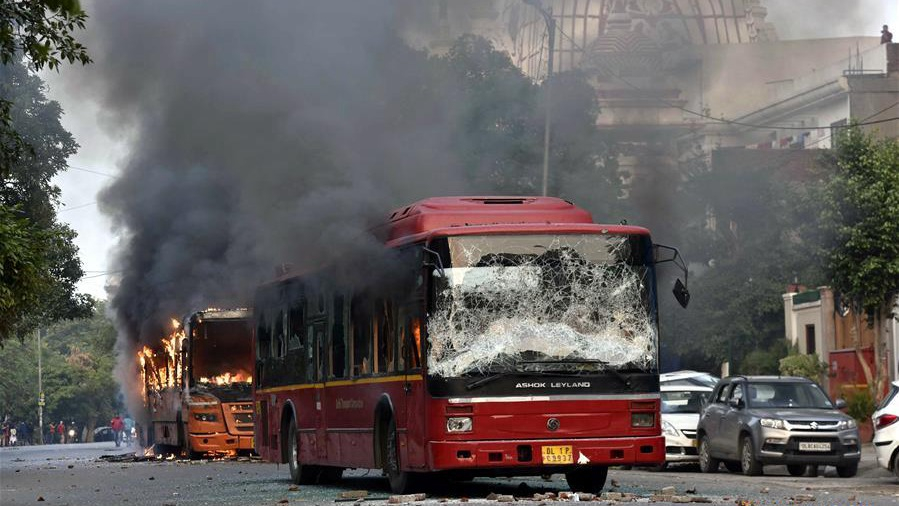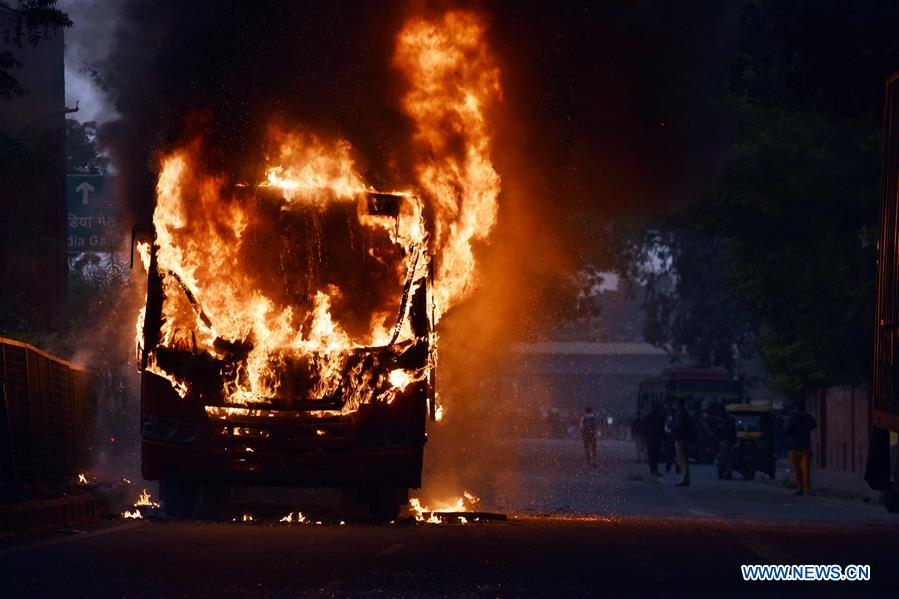
Editor's note: Tom Fowdy graduated from Oxford University's China Studies Program and majored in politics at Durham University. He writes about international relations focusing on China and the Democratic People's Republic of Korea. The article reflects the author's opinions and not necessarily the views of CGTN.
The other week a report by the media watchdog "Fairness and Accuracy in Reporting" noted that Western media had excessively covered events in Hong Kong above other movements of unrest and violent protests in the world. Hong Kong had been covered by a selected range of outlets over 700 times, while in Chile had been covered just 36 times. The organization found how the narrative in such reporting was also strictly one sided, glorifying events in the Chinese city and demonizing authorities while framing protests in other countries in considerably negative terms. It summarized the coverage as "manufacturing consent" for Western foreign policy aims, a Western phenomenon coined by Noam Chomsky in his 1988 essay.
On this backdrop, India is currently being rocked by violent protests owing to the ruling BJP (Bharatiya Janata Party) party's anti-refugee law, which explicitly discriminates against Muslims. The bill comes in bar with a wider tidal wave of religious nationalism pursued by the country's Prime Minister Narendra Modi, which has seen over 1 million Muslims stripped of citizenship in Assam province and a complete lockdown in Kashmir, which has even seen removal of the internet. As protests against the current bill have waged on, the government called in the army, which has seen six fatalities.
None of these things have happened in Hong Kong, yet the media narrative and coverage of the two events are completely different. Events in India are being covered with less intensity and in far less partisan terms, while political condemnation of it by Western politicians is completely absent on every level. Why this so? Because geopolitics shapes the coverage beyond which audiences even realize.
India is given a green light to do what it wants because it has become the bedrock of the new "Indo-Pacific" policy in a bid to try to contain China. Therefore, oppression of Muslims is suddenly no longer a moral atrocity, showing how the media "select and deselect" the issues they want people to care about, which also raises questions about their narrative concerning Xinjiang, too.

Photo taken on Dec. 15, 2019 shows a passenger bus in flames in New Delhi, India. Protesters in the Indian capital set ablaze several vehicles Sunday, including three buses during their protest over new citizenship law, according to officials. /Xinhua Photo
Photo taken on Dec. 15, 2019 shows a passenger bus in flames in New Delhi, India. Protesters in the Indian capital set ablaze several vehicles Sunday, including three buses during their protest over new citizenship law, according to officials. /Xinhua Photo
As one Australian professor noted on Twitter a few days ago, their own country's policy (or the West's) on Muslim human rights seems to be limited by the geographical boundary of the Karakoram Mountains. To the north of the range, governments are spouting outrage about Xinjiang, while on the other they are completely silent about oppression of Muslims in India and instead likely to praise the so called "shared values," which Modi's country holds with them. This of course is a sign of the political priorities of the time. The United States and its allies have launched its "Indo-Pacific" mantra and thus placed immediate focus on strengthening ties with New Delhi as a counterweight to Beijing. This gives it a free pass to do what it wants domestically.
The emphasis of coverage mirrors the political priorities, hiding under the Western disguises of "independent media" and "impartial journalism." Coverage of events in India is minimal, benign and not coated with a fabric of moral outrage as seen in China and Hong Kong related reporting despite the fact what is happening is actually far worse.
For example, the BBC continues to keep Hong Kong on the agenda at all costs, with endless levels of headline stories but also feature pieces, "analysis" and video presentations; a protester being shot (and not killed) in a close confrontation with police can become the lead story all day. Yet events in India, despite the fact the army is using live fire against protesters, is disinterest.
Why so? Because as Chomsky's scholarship shows, the mainstream media act in practice to "manufacture consent" for elite political goals and interests, with those with the most resources and intrinsic connections holding power to set the narrative over dissenting views, choose what constitutes "news" and also work with associated think tank organizations to employ an industry of "experts" who also operate in tandem to set that narrative. Therefore, the Western argument that "private ownership" constitutes independent and fair media is a misleading ideological trope, which is false in practice.
Thus, over events like this we are seeing an undeniable difference and emphasis in coverage and the tone which follows. The case study of India shows how differing political and ideological priorities can drastically shift what is deemed important to cover extensively and what is not.
The bar on what is described as an oppression of protesters is not consistent, for Hong Kong it is extremely low with the purpose of further exacerbating unrest, but for India and others it simply does not exist. Do you hear the voices of these protesters every day? Are they glorified as benevolent and forward thinking? Absolutely not. Thus, one country can also be vilified for an alleged persecution of Muslims, and another not so.
(If you want to contribute and have specific expertise, please contact us at opinions@cgtn.com.)